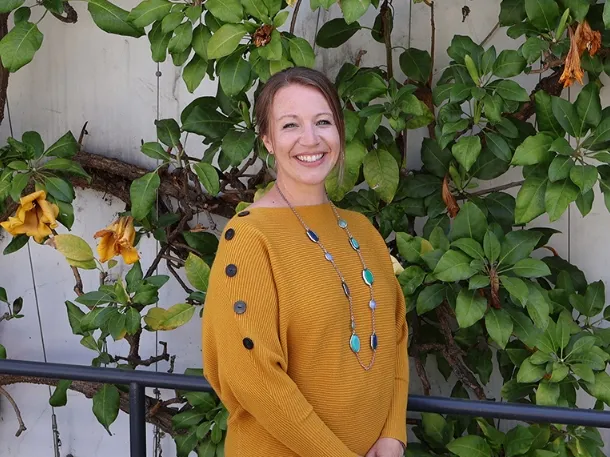- Home
- >
- APU Articles
- >
- News Article
Faculty Friday: Traci Birge — Helping Students Discover Who God has Called Them to Be
May 12, 2023 | Written By Megan Wilhelm

“If you’re bringing your difficult questions to God, that means you trust God in a vulnerable and raw way. That is real faith, even if we are unsure of what it means.”
Birge started at APU in August 2018 after teaching at Roberts Wesleyan. Due to financial constraints, the position at her alma mater was cut, so Birge took a year to think about what she wanted to do moving forward. APU, with its Wesleyan tradition and location in sunny Southern California, appealed to Birge, who was used to snow nine months out of the year. Birge applied, but was hesitant since she had yet to finish her dissertation. “Every step of the way I was surprised. I didn’t expect that I deserved it. I was just willing to give it a try, and it was the best (and easiest) decision I’ve ever made,” she said. Birge credits her success to her lack of expectations and trusting God would guide the process. “I think not knowing how it would turn out actually made me less nervous, which made me more genuinely myself,” she said. Four and half years later, she brings this same authenticity to her classes, students, and colleagues.
In her three classes — Exodus/Deuteronomy, Rising of the King (I & II Samuel), and Old Testament Prophets — Birge is constantly challenging her students to ask sincere questions as they explore the meaning of scripture. As a scholar on narrative theory, she hopes to convey to her students the power of stories, especially those in the Old Testament. “I love narratives because I think their ability to shape us is profound. When you read a story, you’re not just learning because you can figure out what the moral is, you’re learning because you relate to the characters–it’s like experience with training wheels,” she said. Instead of telling students what to believe about scripture, she wants her students to hear the story and discern the message and truth of scripture for themselves.
“For me, it’s not about teaching answers, it’s about teaching humility and earnestly seeking God through the text,” she said. “How should you read scripture? It’s too easy to hear what you want to hear, rather than what God wants you to hear. We need to lean into what the biblical text is saying, not what we want it to say.”
A specific area of scripture that Birge enjoys teaching are the Old Testament prophets. She is particularly fascinated by the ways in which Generation Z is connecting the prophets to their world. “Every generation has their own specific set of circumstances, so hearing how this generation is connecting the prophets with their world is really profound,” she said. Always hoping to create a sacred space for students to apply scripture to their lives, one of Birge’s students recently made the connection between herself and the Israelites. “You have seasons in your life that the blessing itself is survival, not abundance and thriving. I think that social media and all of these different external realities make us think that if we’re not thriving we’re failing,” Birge recalled. “If that’s all the messaging you’re seeing, it becomes a narrative that’s not only unsustainable, but inaccurate as well. It’s only half the picture. Sometimes, surviving is enough.” As a biblical studies professor, Birge hopes to continue helping her students experience the revelations that come with studying scripture.
Most of all, Birge encourages students to embrace who God has created them to be so they may glorify their Creator, a process she went through at the beginning of her teaching career. Only after embracing her quirks and unique gifts was Birge able to fully live out her calling as a professor. “Figure out who you are and what God has called you to be,” she said. “Obedience, at the end of the day, is not about whether or not you simply follow all the rules, it’s whether you love God with your whole being and trust Christ to form you into the person God has called you, and only you, to be.”